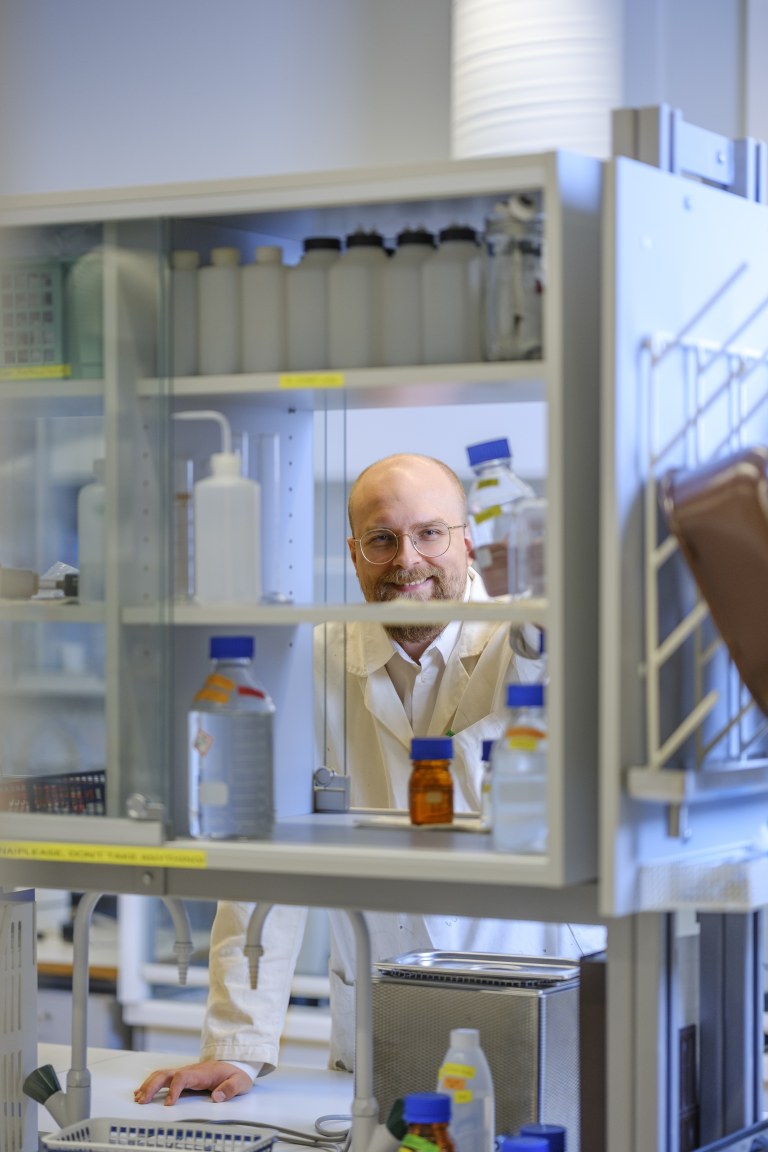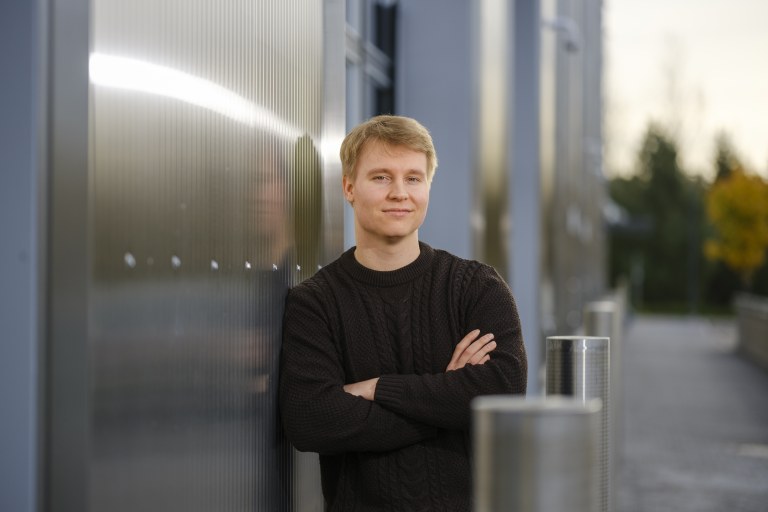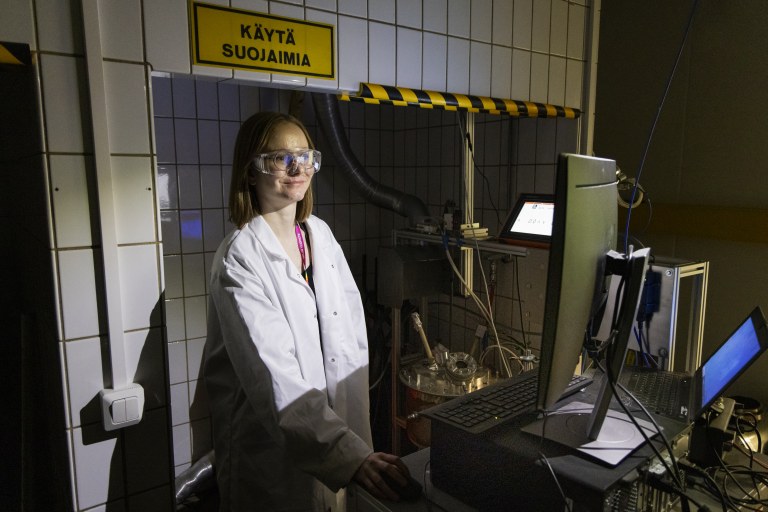
The award from the best doctoral thesis of the year will be given to Juho Uzkurt Kaljunen from Aalto University for his thesis on the recovery processes of nitrogen and phosphorus from wastewater.
The award for the best master’s thesis in engineering or architecture will be given to Janne Pitkänen from the University of Oulu for his thesis that can help estimate the lifetime of nuclear power plant pressure equipment more accurately.
The award for the best master’s thesis in mathematics, physics or computer science will be given to Henna-Riikka Putaala from the University of Oulu for her thesis that helps to make more accurate predictions of climate trends.
The awards are presented today, 13 November, in Helsinki by the Academic Engineers and Architects in Finland TEK, Tekniska Föreningen i Finland TFiF and the Academic Association for Mathematics and Natural Sciences MAL.
Read more about the winning theses below.
Nutrients from waste streams recovered and used as fertilizers

The award for the best doctoral thesis goes to Doctor of Science in Technology Juho Uzkurt Kaljunen from the Aalto University School of Engineering, Department of Built Environment, Water and Environmental Engineering research group.
The title of his doctoral thesis is “Waste nutrients harvested: Design and evaluation of nitrogen and phosphorus recovery processes utilizing membrane contactor and adsorption techniques”.
In his thesis, Uzkurt Kaljunen investigated methods to cost-effectively recover nitrogen and phosphorus from wastewater, as well as phosphorus from sludge.
“This thesis presents a method for bringing nutrients to market as safe circular economy products, but that in itself is not enough. This requires a lot of market development, logistics and the development of agricultural practices before a significant change can be achieved,” he says.
According to Uzkurt Kaljunen, there are so many nutrients in our wastewater that they could replace a significant proportion of mineral fertilizers. This would reduce the dependence of Finnish agriculture on imports of Russian fertilizers and improve our food security. Nitrogen and phosphorus are important nutrients for crops.
Uzkurt Kaljunen’s thesis aims to promote nutrient recovery and recycling.
“In practice, we set up a company based on the results, as commercialising the results was the best way to utilise them,” he says.
NPHarvest is a one-year-old startup. The company is based on a project already completed by the water researchers at Aalto University in which they developed the NPHarvest process. The process precipitates phosphorus and uses a membrane to separate nitrogen from liquid waste streams. Uzkurt Kaljunen was involved in the project already while writing his master’s thesis.
NPHarvest is currently aiming to complete the testing equipment and then rent them out for reference and later also sell them to customers. The company’s customers could include biogas plants, wastewater treatment plants and farms. In the future, the company wants to develop the market for recycled fertilizers, which are still in their infancy, says Uzkurt Kaljunen.
Uzkurt Kaljunen’s thesis will also be useful for developing wastewater treatment systems and optimising costs. He explains that the costs and environmental emissions of conventional wastewater treatment can be reduced by recovering nutrients from wastewater. Phosphorus, for example, causes eutrophication in bodies of water.
TEK and TFiF present Uzkurt Kaljunen with an honorary certificate and a cash prize of 7,500 euros for a high-quality doctoral thesis by international standards which has remarkably advanced competence in the field of technology in Finland.
The supervising professor of the winning thesis was Assistant Professor Anna Mikola and the thesis advisor was Postdoctoral Researcher Raed Al-Juboori from the Aalto University School of Engineering.
(Article continues after the video.)
“This makes a difference and it’s fun. That gives me motivation.” Watch a short video interview with Juho Uzkurt Kaljunen.
Safer and longer-lasting nuclear power
The award for the best master’s thesis in engineering or architecture goes to Master of Science in Technology Janne Pitkänen from the University of Oulu, Faculty of Technology, Degree Programme in Mechanical Engineering.
The title of Pitkänen’s master’s thesis is “Estimation of thermal fatigue rate with outer surface temperature measurements in a nuclear power plant pressure equipment”.
(Article continues after the photo.)

In his thesis, Pitkänen examined component fatigue caused by temperature fluctuations, focusing on pressure equipment in a nuclear power plant. Pitkänen’s study was based on temperature time histories measured on the outer surfaces of components. Written for the Finnish Radiation and Nuclear Safety Authority (STUK), the thesis aimed to investigate the potential and limitations of such real-time temperature monitoring.
“My thesis can help to ensure the safe operation of nuclear power plant pressure equipment by obtaining information on the stresses they are subject to and the calculated utilisation rate. This allows a more accurate estimate of the remaining service life of pressure equipment and their inspection and replacement needs,” says Pitkänen.
According to Pitkänen, there is over-conservatism in the calculated service life of nuclear power plant components, which can be reduced by the results of his thesis. Even if a nuclear power plant has exceeded its original intended service life, the thermal stresses of the components can be reassessed and found to still be within the safety margin in terms of thermal fatigue. The results of the thesis can therefore be used when there is a need to confirm the safe service life of a component that is subject to thermal fatigue.
“The method can also be applied to new nuclear power plants throughout their lifetime, providing up-to-date data on the thermal fatigue of components. This data is more realistic than data obtained by traditional methods,” says Pitkänen.
Pitkänen wrote his master’s thesis for the Finnish Radiation and Nuclear Safety Authority (STUK), where he had previously had a summer job. He now works at STUK as an inspector of mechanical equipment and as a specialist in material strength technology.
The supervisors of the master’s thesis were Professor Antti H. Niemi from the University of Oulu and Inspector Matti Hautala from the Radiation and Nuclear Safety Authority.
TEK and TFiF present Pitkänen with an honorary certificate and a cash prize of 5,000 euros.
More accurate climate models

The award for the best master’s thesis in mathematics, physics or computer science goes to Henna-Riikka Putaala from the University of Oulu, Faculty of Science, Degree Programme in Physical Sciences.
The title of Putaala’s master’s thesis is “Ilmakehän ionisaation rekonstruktio syväoppimisverkkojen avulla vuosille 1844–2021” (“Reconstruction of atmospheric ionisation using deep learning networks for years 1844–2021”).
In her thesis, Putaala reconstructed the daily energy distribution of electrons that precipitated from space into the Earth’s atmosphere between 1844 and 2021. Electrons are constantly precipitated into the atmosphere from space, and their number varies according to the activity of the Sun, among other things.
Until now, information on the number of electrons has been available since the 1970s, when satellite measurements first began. Putaala used deep learning networks to study the period before satellite measurements.
The deep learning networks were trained to learn the link between electron observations and geomagnetic activity. Putaala explains that geomagnetic activity shows the effects of solar wind on the Earth’s magnetic field and has been measured since 1844. These observations allowed deep learning networks to estimate the energy distribution of electrons long before actual satellite measurements began.
Based on the reconstructed electron energy distribution, Putaala calculated atmospheric ionisation caused by incoming electrons. When the electrons enter the atmosphere, they ionise atmospheric particles and molecules, which in turn has an impact on the winter climate in polar regions, for example.
“My thesis can help improve the climate models that are currently in use, as it provides a more accurate estimate of the ionisation level than the version used in the current models,” says Putaala.
“More accurate models will naturally improve scientists’ understanding of the mechanisms affecting the climate, and could potentially lead to more accurate predictions of how the climate will develop,” she continues.
Putaala completed her thesis in the Space Climate research group. She is now working on her doctoral thesis at the Process Metallurgy research unit of the University of Oulu. The topic of the doctoral thesis is the use of hydrogen plasma for steelmaking.
The supervisor of her master’s thesis was Associate Professor Timo Asikainen from the University of Oulu.
TEK and MAL present Putaala with an honorary certificate and a cash prize of 5,000 euros.
Solutions to problems
Every year, TEK and TFiF present an award for the best doctoral thesis of the year; the award was now granted for the 26th time. The organisations established the award to encourage graduate engineers and architects to pursue further studies and to raise the profile of postgraduate degrees.
“Doctoral education in technology gives you the skills to identify important issues and to find solutions that can be successfully implemented. Pursuing postgraduate studies also teaches you to lead technology development projects,” says Mikko Särelä, expert for industrial and innovation policy at TEK, on the importance of postgraduate studies.
TEK and TFiF also give out an annual award for a master’s thesis in engineering or architecture that is wide-ranging and useful and has novelty value.
“Experts in technology are the ones who provide solutions to the major challenges facing our society today. Having a broad knowledge base is crucial for solving problems in a sustainable way for the future. In addition to subject knowledge, meta-skills, such as interpersonal skills and continuous learning, are important in problem solving,” says Annika Nylander, CEO at TFiF.
TEK and MAL also present an award to a master’s thesis in mathematics, physics or computer science. The aim of the award is to draw attention to the study of mathematics, physics and computer science and to highlight the importance of these disciplines in Finnish society.
Finalists for the doctoral thesis award 2024
- Maria Ameziane, Aalto University
“Solid-state lithium magnetoionics for voltage control of magnetic phenomena” - Markus Hiekkamäki, Tampere University
“Quantum Interference in Transverse Spatial Modes of Photons” - Niklas Jantunen, LUT University
“Development of liquid–liquid extraction processes for concentrated hydrometallurgical solutions” - Winner: Juho Uzkurt Kaljunen, Aalto University
“Waste nutrients harvested: Design and evaluation of nitrogen and phosphorus recovery processes utilizing membrane contactor and adsorption techniques” - Elli Leppänen, Aalto University
“Exploring the Complex and Diverse World of Carbon Electrochemistry - Unraveling the Interplay Between Structure-Property Relationships”